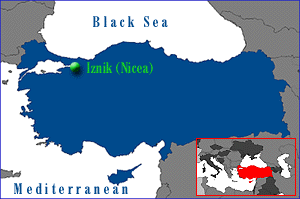 On this day, July 25 in 325 a.d. the First Ecumenical Council, the Council of Nicea, came to close. It met for two months and twelve days. Three hundred and eighteen bishops had taken part.
On this day, July 25 in 325 a.d. the First Ecumenical Council, the Council of Nicea, came to close. It met for two months and twelve days. Three hundred and eighteen bishops had taken part.
It was to combat Arianism that the Council was convened. The anti-Arians were led by Alexander, the Bishop of Alexandria and following him, by Athanasius. For them it was an issue of the future of Christianity. If Christ were not God, he could not be the revelation of God. If Christ were not God, men and women had not been redeemed by God. If Christ were not God, believers were not united to God. If Christ were not God, Christians had no right to worship him. To do so would be to revert to paganism and idolatry.
If Christ were a creature, no matter how exalted, or even a kind of inferior deity (god, but less than the sovereign Lord of Creation of Providence) worship of him would be entirely illegitimate. The Nicene Creed therefore insisted that Jesus Christ was “of one substance with the Father [Latin consubstantialem Patri, Greek original homoousion].”
Despite some confusion as to the exact meaning of the Latin term substatia—the Greek church understood it differently to the Western church—the intent of the phrase was clear enough. In employing the word hmoousion it identified itself with the language of Athanasius and against Arius. Arius had used a similar term, one which included the Greek letter iota – homoiusios, which meant that Jesus was similar to the Father but the equal with the Father. It had given rise to the saying, “Not an iota of a difference.”
But one little letter made all the difference in the world. It’s inclusion denied the full deity of Jesus Christ, something which for Nicea called into question the very survival of the Christian gospel.
We can be grateful today for providence of God that gave to the church the Nicene Creed, maintining for us the full deity of Jesus Christ.
Tuesday, July 25, 2006
Nicea 325 AD
Subscribe to:
Post Comments (Atom)



3 comments:
Dr. Thomas,
I can remember the first time I read the Nicene creed as a 23ish year old Baptist. I felt like a gem had been hidden from me my entire life, it's such a wonderfull summary of the Christian faith - still much better than many of the statements of faith that various groups come up with.
One question though, I've noticed that among the Presbyterians that say creeds in worship the Nicene seems to never be used. Why is that?
thanks,
Ronnie
Presbyterians have been wary of employing creeds in worship services generally -- take a look at the Directory for the Public Worship of God (1645). Part of the reasoning, I think, has been that a profession of faith rather than a creedal agreement has been the Presbyterian requirmeent for membership in a church. Only officers subscribe, say, the Westminster Confession of Faith. The Apostles' Creed has fared better, though.
Some have found the expression "God of God, Light of Light" to imply that the Father is the "fount" or "source" of the Son's deity, an interpretation that was certainly present in the early church and one which Calvin addressed by insisting that the Son was "autotheos" etc.
Then again, traditonally, the Nicene Creed was the "Creed of choice" for the medieval Catholic church in the liturgy of the Mass! Perhaps that, too, was a factor.
Dr. Thomas,
Here in this moment in church history you see the church leaders gathering to discuss and make decisions on important theological issues. I was wondering why we do not see this happening today? Maybe it is because I am new to be presbyterian so I thought I would ask. My example would be this year's PCA General Assembly. The issues over the federal vision were handed over to I guess a study committee. It seems to me that the federal vision has had enough time to be studied and understood. Many well known reformed and presbyterian leaders have called this teaching out and found it outside the confession and not biblical. So why are issues like this treated I guess as secondary issues at the GA of the PCA. It would seem to me for doctrinal purity and to guard the Gospel that issues like the FV theology would be first and foremost on the table of business needing to be dealt with. I was just wondering if this is just how presbyterianism is set up, or have we just lost touch with our past were doctrinal issues were of the upmost importance, and dealt with quickly and maybe even severly?
Your Fellow Servant in Christ,
Michael Gore
Post a Comment